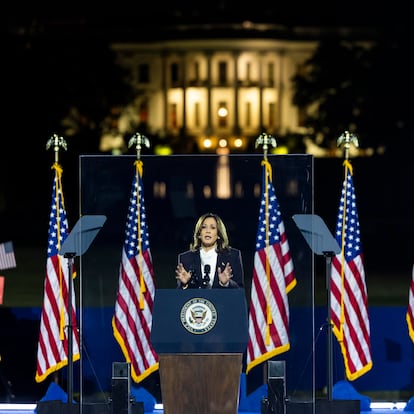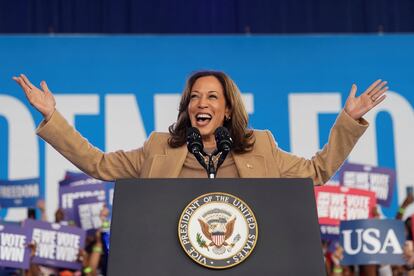Kamala Harris: The candidate who breaks glass ceilings but refuses to talk about them
The Democrat, who could become the first Black woman and Asian American to hold the presidency of the United States, maintains that voters do not choose by gender or color but by the candidate’s plan to ‘solve their problems’


“On day one, Donald Trump would walk into the Oval Office with an enemies list. When I am elected, I will walk in with a to-do list full of priorities focused on the American people,” Vice President Kamala Harris promised this week on the Ellipse, the large esplanade in front of the White House, in front of 75,000 people who — according to her campaign — exceeded the capacity of the venue and spilled out onto the grass of the adjacent parks. The image was, as the Democratic candidate hoped, a preview of what could happen after Tuesday’s election: the first woman, and the second Black president of the United States delivering a speech to the nation.
During the final two weeks of the campaign, the Democratic candidate has appeared at her rallies surrounded by stars, each one more famous than the last. From Tigres del Norte and Maná, to Bruce Springsteen and even Beyoncé. All of this to convey a message of optimism and power regarding the defense of democracy and rights — especially abortion — when the polls point to a stubborn tie between her and Trump.
What neither Harris nor her party have done is to emphasize at any point the historic nature of her career. “She is the strongest and the best and that is why she is in the position she is in. Her being a woman is the icing on the cake,” said former House Speaker Nancy Pelosi in August, in a talk with journalists during the Democratic convention in Chicago. Harris herself has occasionally seemed annoyed when asked about the matter: “Next question,” she replied in August, in her first televised interview after assuming the nomination, regarding about her identity as a Black woman, which Trump had questioned days earlier. Her intention, she says, is to show that she wants to govern for everyone.
Part of the reason is that there is little need to stress the obvious. Lessons have been learned from the defeat of Hillary Clinton in 2016, who during her campaign, under the slogan “I’m with her,” promised to break the “highest, hardest glass ceiling” and failed. But it is also a question of personality: during her first term as vice president Harris wanted to avoid being handed portfolios related to gender, so as not to be pigeonholed. And it is a question of not giving arguments to a Republican Party that has tried to portray her as a candidate selected not for her qualities, but to meet gender and minority representation quotas.
Behind the vice president’s reluctance to exploit the historic nature of her candidacy is also a concern not to alienate part of the male vote, where among groups such as African American men — who have traditionally supported Democrats in large numbers — it may be more difficult to accept the idea of having a woman as their leader.
In the United States, “there is still a small, but not insignificant, number of Americans who continue to believe that men make better political candidates than women,” said Diana O’Brien, a professor at Washington University in St. Louis and an expert on female political representation, in a talk with foreign journalists.
Former president Barack Obama himself, when campaigning for Harris, urged African American men to back the vice president, amid polling evidence that support for the Democratic ticket among this constituency is lower than in previous elections, while support for Trump is increasing. “You’re coming up with all kinds of reasons and excuses. I’ve got a problem with that. Part of it makes me think that, well, you just aren’t feeling the idea of having a woman as president, and you’re coming up with other alternatives and reasons for that,” Obama said during a speech in Pittsburgh, Pennsylvania.
Trump himself has tried to suggest that Harris would be a weak leader on the global stage simply because she is a woman. “There are voters who will not support Harris because of a gender issue. Trump has tried to make gender an issue, expressing the view that world leaders would not take her seriously as president. Harris has responded by avoiding talking about how her victory would be a historic event,” says Katherine Tate, a professor of political science at Brown University.
But, although she avoids dwelling on her gender, Harris does speak profusely about the priorities for female voters, especially the right to abortion: for the youngest voters, the biggest factor in this election. The Democratic candidate makes constant references to the issue in her campaign events and has called entire rallies dedicated to the issue, such as the one she held in Houston 10 days ago accompanied by Beyoncé.
Women have responded by coming out in support: all polls indicate that the female vote, which has historically leaned toward Democrats, is more tilted than ever in this election in favor of Harris. If in 2022, 55% of women supported her, now the difference with respect to men is between 14 and 30 percentage points. The gender gap is especially wide among those under 30: statistician John Zogby calculates that among this group, the difference between women and men who support Harris is 60 percentage points.

“She is appreciated by women, especially young women,” the expert notes. “In fact, in many ways, because she is multi-racial and multi-ethnic, she represents a large part of the millennial and Z generations, which have the highest proportion of multi-ethnic backgrounds of all voting groups in the U.S.”
As of today, polls point to a tie between Harris and Trump, which will be decided by a handful of votes in the seven swing states: Pennsylvania, Michigan, Wisconsin, Nevada, Arizona, Georgia, and North Carolina. It is a panorama that would have seemed almost unthinkable before Sunday, July 23, when despair was spreading among Democratic supporters. President Joe Biden was clinging to the nomination despite pressure from his party and his catastrophic debate against Trump. Polls predicted a disaster in November. Donations were drying up.
The vice president, an avid cook, had just finished breakfast with her family at her official residence at the Naval Observatory in Washington and was about to complete a puzzle with her nieces. The phone rang. It was Biden. The president wanted to let her know that he was about to announce his withdrawal from the re-election campaign and was going to support her as his replacement. It was an unprecedented step in the history of the United States. The Democratic nomination was in the hands of Harris, just three months before Election Day.
Her first reaction, she later said, was to think of Biden himself, and ask him if he was sure about what he was doing. And then to call her spiritual adviser, Baptist pastor Amos Brown, in San Francisco. “Instinctively, I understood the gravity of that moment,” said the former California attorney general, daughter of a Jamaican father and an Indian mother, on CNN last month.
The changeover was a major boost for a Democratic campaign which, until then, had had trouble mobilizing even its own supporters, plagued by skepticism about the physical and mental suitability of its candidate and, in the case of progressive groups, over the government’s position on the war in Gaza. Suddenly, Democrats went from assuming that an electoral trouncing was a certainty to seeing that there was a game to be played.
The vice president, who had gone largely unnoticed for three years in office, was transformed almost overnight into a formidable political force, drawing crowds to her rallies, raising hundreds of millions of dollars, surging in the polls and even pulling ahead of Trump. At the Democratic Party convention in Chicago in August, she accepted the nomination before a fervent crowd. Her finest moment came in the only debate against her rival, when she got Trump to take the bait by mocking the size of the crowds at the former president’s rallies and his willingness to leave before they were over.
But after the enthusiasm generated in the first six weeks of Harris’s campaign, the race has entered an impasse in which no comment, no electoral act, seems able to move the dial. Any result seems possible.
Sign up for our weekly newsletter to get more English-language news coverage from EL PAÍS USA Edition
Tu suscripción se está usando en otro dispositivo
¿Quieres añadir otro usuario a tu suscripción?
Si continúas leyendo en este dispositivo, no se podrá leer en el otro.
FlechaTu suscripción se está usando en otro dispositivo y solo puedes acceder a EL PAÍS desde un dispositivo a la vez.
Si quieres compartir tu cuenta, cambia tu suscripción a la modalidad Premium, así podrás añadir otro usuario. Cada uno accederá con su propia cuenta de email, lo que os permitirá personalizar vuestra experiencia en EL PAÍS.
¿Tienes una suscripción de empresa? Accede aquí para contratar más cuentas.
En el caso de no saber quién está usando tu cuenta, te recomendamos cambiar tu contraseña aquí.
Si decides continuar compartiendo tu cuenta, este mensaje se mostrará en tu dispositivo y en el de la otra persona que está usando tu cuenta de forma indefinida, afectando a tu experiencia de lectura. Puedes consultar aquí los términos y condiciones de la suscripción digital.








































